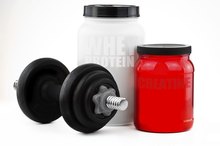What does fact checked mean?
At Healthfully, we strive to deliver objective content that is accurate and up-to-date. Our team periodically reviews articles in order to ensure content quality. The sources cited below consist of evidence from peer-reviewed journals, prominent medical organizations, academic associations, and government data.
- "Journal of the International Society of Sports Nutrition;" International Society of Sports Nutrition Position Stand: Protein and Exercise;Bill Campbell et al; September 2007
- "Journal of the International Society of Sports Nutrition;" International Society of Sports Nutrition Position Stand: Protein and Exercise;Bill Campbell et al; September 2007
The information contained on this site is for informational purposes only, and should not be used as a substitute for the advice of a professional health care provider. Please check with the appropriate physician regarding health questions and concerns. Although we strive to deliver accurate and up-to-date information, no guarantee to that effect is made.
How Much Protein Per Day if Working Out?
If you work out regularly, you may need to consume more protein than sedentary people. When combined with exercise, protein helps you maintain and build additional muscle mass. Consuming adequate amounts of protein can also help with recovery post exercise. How much protein you need daily depends on the types of workouts you perform and the intensity of these sessions.
Significance
The Institute of Medicine recommends 0.8 g of protein per kg of body weight per day. This recommendation is appropriate for approximately 97.5 percent of healthy adults, but may be too little for people who exercise. During exercise, you burn protein and amino acids and the Institute of Medicine minimal recommended amounts may not adequately offset this burn. In addition, this recommendation may not provide enough amino acids to promote muscle growth and repair.
- The Institute of Medicine recommends 0.8 g of protein per kg of body weight per day.
- This recommendation is appropriate for approximately 97.5 percent of healthy adults, but may be too little for people who exercise.
Recommendations
Can Protein Supplements Cause Protein in the Urine?
Learn More
The International Society of Sports Medicine recommends that endurance athletes consume between 1 and 1.6 g of protein per kg of body weight 1. If you are extremely active, such as an elite cyclist or marathoner, you should aim for the high end of this range. Because strength training puts even more stress on your muscles, power and strength athletes should consume between 1.6 and 2.0 g of protein per kg of body weight daily. Competitive bodybuilders might aim for the high end of this range.
- The International Society of Sports Medicine recommends that endurance athletes consume between 1 and 1.6 g of protein per kg of body weight 1.
- Because strength training puts even more stress on your muscles, power and strength athletes should consume between 1.6 and 2.0 g of protein per kg of body weight daily.
Considerations
You should aim to get most of your protein from whole foods, such as:
- lean meats
- fish
- poultry
- dairy
- eggs
- soy
- beans
Supplements such as whey and casein powder may occasionally serve as an additional source of protein. If you suffer from any medical conditions involving the kidneys, consult your physician before increasing your protein intake.
Timing
Protein Vs. No Protein for a Workout
Learn More
Your body can only utilize about 30 g of protein in one sitting for muscle synthesis, as shown by a study published in the "Journal of the American Dietetic Association" in 2009. Your body excretes extra protein through urine or burns it off for energy. When you add protein to your diet, try to schedule one serving to eat around the time of your workout. Eating protein before exercise provides amino acids for your body to use during the session. When you eat protein immediately after, it can help facilitate repair, growth and recovery.
- Your body can only utilize about 30 g of protein in one sitting for muscle synthesis, as shown by a study published in the "Journal of the American Dietetic Association" in 2009.
- When you eat protein immediately after, it can help facilitate repair, growth and recovery.
Related Articles
References
- "Journal of the International Society of Sports Nutrition;" International Society of Sports Nutrition Position Stand: Protein and Exercise;Bill Campbell et al; September 2007
- Thomas, D. T., Erdman, K. A., & Burke, L. M. (2016). Position of the academy of nutrition and dietetics, dietitians of Canada, and the American College of Sports Medicine: Nutrition and athletic performance. Journal of the Academy of Nutrition and Dietetics, 116(3), 501-528.
- Bauer, J., Biolo, G., Cederholm, T., Cesari, M., Cruz-Jentoft, A. J., Morley, J. E., ... & Visvanathan, R. (2013). Evidence-based recommendations for optimal dietary protein intake in older people: a position paper from the PROT-AGE Study Group. Journal of the American Medical Directors Association, 14(8), 542-559.
- Manninen, A. H. (2004). High-Protein Weight Loss Diets and Purported Adverse Effects: Where is the Evidence? Journal of the International Society of Sports Nutrition, 1(1), 45.
- Halton, T. L., & Hu, F. B. (2004). The effects of high protein diets on thermogenesis, satiety and weight loss: a critical review. Journal of the American College of Nutrition, 23(5), 373-385.
- Pasiakos, S. M., Cao, J. J., Margolis, L. M., Sauter, E. R., Whigham, L. D., McClung, J. P., ... & Young, A. J. (2013). Effects of high-protein diets on fat-free mass and muscle protein synthesis following weight loss: a randomized controlled trial. The FASEB Journal, 27(9), 3837-3847.
- Burd, N. A., van Vliet, S., van Loon, L. J., Beals, J. W., & Paluska, S. A. (2017). Sustained Postprandial Muscle Protein Synthesis Rates after Protein Ingestion in Healthy Young Males. The FASEB Journal, 31(1_supplement), 652-2.
- Mamerow, M. M., Mettler, J. A., English, K. L., Casperson, S. L., Arentson-Lantz, E., Sheffield-Moore, M., ... & Paddon-Jones, D. (2014). Dietary protein distribution positively influences 24-h muscle protein synthesis in healthy adultsâ3. The Journal of Nutrition, 144(6), 876-880.
- Symons, T. B., Sheffield-Moore, M., Wolfe, R. R., & Paddon-Jones, D. (2009). A moderate serving of high-quality protein maximally stimulates skeletal muscle protein synthesis in young and elderly subjects. Journal of the American Dietetic Association, 109(9), 1582-1586.
Writer Bio
Andrea Boldt has been in the fitness industry for more than 20 years. A personal trainer, run coach, group fitness instructor and master yoga teacher, she also holds certifications in holistic and fitness nutrition.









